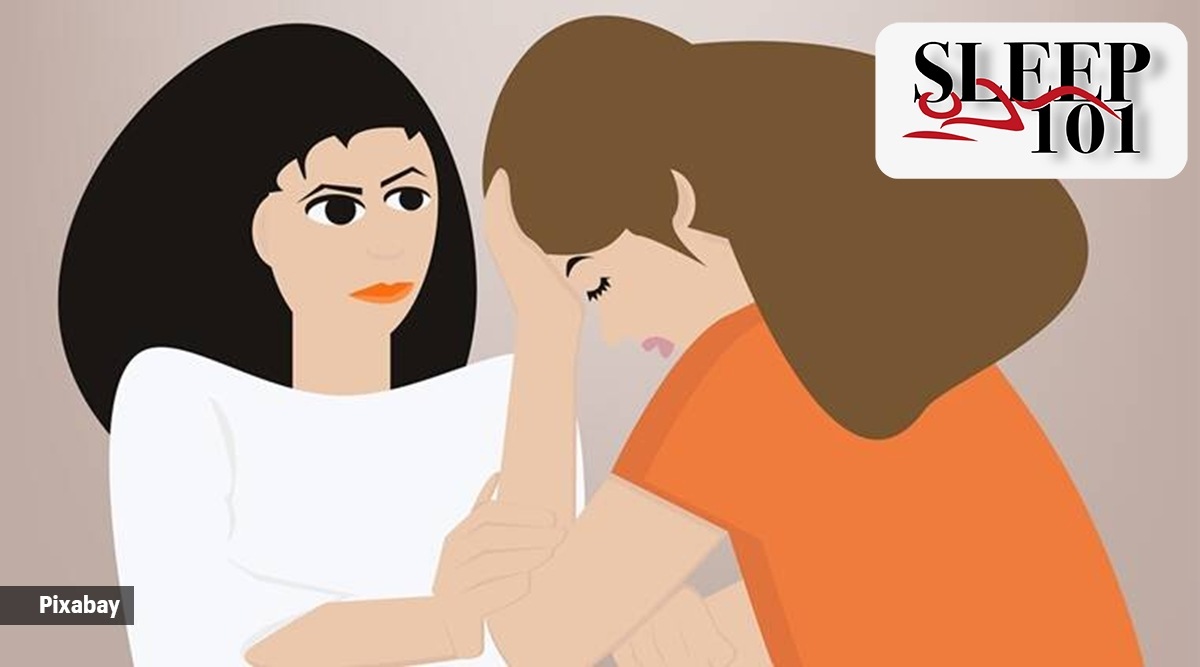📣 For more lifestyle news, click here to join our WhatsApp Channel and also follow us on Instagram
How cognitive behavioural therapy (CBT) can help improve your sleep
The expert explained that the goal of this therapy is to recognise and challenge detrimental thought and behavioural patterns, and to replace them with more productive and adapted ones
 It usually incorporates a systematic process, a predetermined number of sessions, and a variety of approaches, including cognitive restructuring, exposure therapy, and behavioural activation (Source: Pixabay)
It usually incorporates a systematic process, a predetermined number of sessions, and a variety of approaches, including cognitive restructuring, exposure therapy, and behavioural activation (Source: Pixabay)With sleep issues becoming increasingly common among people, many are turning to varied techniques, in addition to following adequate sleep hygiene, to improve the quality of their sleep. One such method that is gaining prominence is cognitive behavioural therapy (CBT) – a type of psychotherapy that focuses on modifying unpleasant or detrimental beliefs, actions, and emotions.
“Sleep quality is enhanced through cognitive behavioural therapy (CBT), which modifies the behaviour and thought patterns. It aims to improve the coping mechanisms and way of life in order to support restful sleep,” said Dr Praveen Gupta, MD (Medicine), DM (Neurology), Director and Unit Head, Neurology, Fortis Memorial Research Institute, Gurgaon, adding that another reason for selecting CBT over medication is that it calms the mind, changes behaviours, and enhances the daily routine.
The expert explained that the goal of this therapy is to recognise and challenge detrimental thought and behavioural patterns, and to replace them with more productive and adapted ones. “It usually incorporates a systematic process, a predetermined number of sessions, and a variety of approaches, including cognitive restructuring, exposure therapy, and behavioural activation,” he added.
Agreeing, Dr Gorav Gupta, Senior Consultant Psychiatrist, Tulasi Healthcare, Delhi said that CBT is a short-term, goal-oriented therapy that focuses on identifying and challenging negative thoughts and beliefs to help individuals learn new coping skills and strategies.
How does it work?
Elucidating the same, Dr Gorav added that it can help with sleep by addressing negative thoughts and behaviours that may be contributing to sleep problems. “It may involve developing a consistent sleep routine, challenging negative thoughts about sleep, learning relaxation techniques, and addressing underlying factors such as anxiety or depression. CBT has been shown to be effective in improving sleep quality and duration.”
 Sleep soundly in a comfortable bed (Source: Getty Images/Thinkstock)
Sleep soundly in a comfortable bed (Source: Getty Images/Thinkstock)
Agreeing, Dr Bhupendra Chaudhary, Consultant – Psychiatry, Manipal Hospital, Old Airport Road, Bangalore said that it focuses on inaccurate beliefs about sleep to reduce catastrophic thinking and worrying about the consequences of failing to get good sleep. “CBT works on factors that perpetuate or exacerbate chronic insomnia. The factors are poor sleep habits, hyper-arousal periods, irregular sleep schedules, inadequate sleep hygiene, and misconceptions about sleep,” he said.
The primary use of CBT at the current time is directed toward insomnia, according to Dr Satyanarayana Mysore, HOD and Consultant, Pulmonology, Lung Transplant Physician, Manipal Hospital, Old Airport Road, Bangalore. This is corroborated by 2015 meta-analysis of 20 randomised controlled studies of CBT-i for patients with chronic insomnia that found average reductions of 19 minutes in sleep latency and 26 minutes in time awake after sleep onset. Total sleep time improved by 8 minutes, and sleep efficiency improved by 10%.
What techniques does CBT employ?
Here are some techniques involved in CBT, as per Dr Praveen.
*Sleep restriction therapy: Patients are urged to avoid taking daytime naps and to go to bed earlier than usual to spend less time awake in their beds.
*Sleep hygiene and surroundings: For tranquil sleep, people require a suitable sleeping environment. Individuals will be urged to change their daily habits, such as quitting smoking and watching TV earlier in the evening, in order to maintain good sleep hygiene.
*Stimulus control therapy: Encouraging people to just use their beds for sleeping and avoiding using them for other activities like watching TV or working.
*Relaxation technique: Learning relaxation techniques like mindfulness, progressive muscle relaxation, breathing exercises, and meditation for sleeping better.
*Staying passively awake: Individuals are urged to let go of the worry and try to fall asleep, because stressing about sleep may keep you awake at night.
Who can benefit from CBT?
Calling it one “among the finest options for treating sleep disturbances”, Dr Praveen said that CBT may be helpful for people who experience chronic insomnia, sleep problems, or other diseases, including, pain, depression, or physical conditions like heart disease. “It is something that hardly ever causes damage or undesirable effects. Since it addresses the underlying cause of sleep issues, the therapy method is superior to sleeping medications. As a result, it is beneficial for people who also have other systemic conditions like renal, liver, respiratory, or cardiac illness, as it truly helps to prevent serious addiction and adverse effects,” he said.
While concurring that CBT is generally safe and well-tolerated, Dr Gorav warned that it may not be suitable for individuals with certain medical or psychiatric conditions. “It is important to discuss with a healthcare professional to determine if CBT is appropriate and safe for an individual’s specific situation.”
 Instead of lying in bed worrying about what will happen the next day, bring all thought processes to a complete stop and attempt to relax your mind (Source: Getty Images/Thinkstock)
Instead of lying in bed worrying about what will happen the next day, bring all thought processes to a complete stop and attempt to relax your mind (Source: Getty Images/Thinkstock)
He asked beginners to keep in mind that CBT is a collaborative process between the therapist and the patient. “It may involve homework assignments and practicing new skills outside of therapy sessions. It’s important to be open and honest with the therapist and to communicate any concerns or questions that arise throughout the therapy process. It may take time to see results, but with patience and dedication, CBT can be an effective tool for improving mental health and overall well-being,” he said.
As such, experts also asked to avoid undertaking cognitive behavioural therapy by oneself and seek the assistance of specialists who can examine overall sleep and any sleep abnormalities.
Dos and Don’ts to keep in mind
Dos
*Instead of lying in bed worrying about what will happen the next day, bring all thought processes to a complete stop and attempt to relax your mind.
*Before going to bed, play some relaxing instrumental music.
*Sleep soundly in a comfortable bed.
*Be open and honest with your therapist.
*Collaborate with your therapist to set goals and develop a treatment plan.
*Practice new skills outside of therapy sessions.
*Communicate any concerns or questions.
Don’ts
*Keep your room well-lit before falling asleep and avoid being exposed to harsh lights.
*Prior to going to bed, refrain from using the smartphone or television.
*Avoid heavy eating or excessive exercise right before bedtime.
*Don’t expect immediate results or a quick fix.
*Don’t discontinue medication without consulting a healthcare provider.
*Don’t skip therapy sessions or homework assignments.
*Don’t assume CBT works for everyone or is the only treatment option.
*Don’t be hard on yourself if progress is slow. Change takes time.
(Next in the series: Why it is suggested to stay away from your phone just before you sleep)
📣 For more lifestyle news, follow us on Instagram | Twitter | Facebook and don’t miss out on the latest updates!
📣 For more lifestyle news, click here to join our WhatsApp Channel and also follow us on Instagram
- 01
- 02
- 03
- 04
- 05



























